 MyDogBreeds
MyDogBreeds Miniature Siberian Husky is originated from United States but Black Russian Terrier is originated from Russia. Miniature Siberian Husky may grow 37 cm / 14 inches shorter than Black Russian Terrier. Miniature Siberian Husky may weigh 49 kg / 108 pounds lesser than Black Russian Terrier. Both Miniature Siberian Husky and Black Russian Terrier has same life span. Miniature Siberian Husky may have less litter size than Black Russian Terrier. Miniature Siberian Husky requires Moderate maintenance. But Black Russian Terrier requires High maintenance
Miniature Siberian Husky is originated from United States but Black Russian Terrier is originated from Russia. Miniature Siberian Husky may grow 37 cm / 14 inches shorter than Black Russian Terrier. Miniature Siberian Husky may weigh 49 kg / 108 pounds lesser than Black Russian Terrier. Both Miniature Siberian Husky and Black Russian Terrier has same life span. Miniature Siberian Husky may have less litter size than Black Russian Terrier. Miniature Siberian Husky requires Moderate maintenance. But Black Russian Terrier requires High maintenance
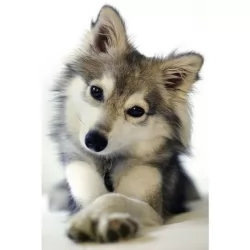 Miniature Siberian Huskies – also known as mini huskies – are your regular Siberian husky bred to be that much smaller than what the breed standard dictates.
Miniature Siberian Huskies – also known as mini huskies – are your regular Siberian husky bred to be that much smaller than what the breed standard dictates.
They’re sought after by those who love the regular sized Siberian Husky but who find the larger dog too large and boisterous. They come complete with the looks and the temperament of the Siberian Husky but they are smaller.
The origins of these gorgeous Mini huskies is conflicting though as some believe they originated in the USA. The name of Bree Normandin is bandied about when talking of the breed’s origin while other refer to Linda S. Spurlin from Alaska. She became interested in them when her full-sized husky became pregnant by a small dog.
Spurlin used Siberian and Alaskan Huskies as well as small Schipperkes and American Eskimo Dogs to bring about the mini version. They’ve got the same pedigree as the Siberian Husky, but it has been selectively bred for its smaller size, also coming from the Spitz family of dogs.
The Miniature Husky is genetically the same as the larger Siberian Husky and the AKC doesn’t recognize it as a separate breed, but sees it as a different size variation of the working-group Siberian Husky.
 During the cold war, the Soviet Union developed the Black Russian Terrier as a working military dog. During the early 1950’s, the Red Star Kennel developed this breed and in 2004 by the American Kennel Club. The Black Russian Terrier is not really a terrier at all, but a mid-sized working dog used for hunting and guarding or as a pet. The Red Star Kennel is thought to have developed the BRT using a wide variety of breeds – as many as seventeen – including breeds like the Newfoundland, the Rottweiler, the Caucasian Shepard Dog and a Giant Shepard and an Airedale. So, you can see the wide variety and several more breeds were added. The Red Star Kennel in Moscow was owned by the state and they developed the BRT for specific working conditions and not for appearance. They did not really care how it looked except that it had to be black. In 1957 the state allowed a few puppies to be sold to non-military breeders. These breeders began to breed the Black Russian Terrier for appearance as well as function.
During the cold war, the Soviet Union developed the Black Russian Terrier as a working military dog. During the early 1950’s, the Red Star Kennel developed this breed and in 2004 by the American Kennel Club. The Black Russian Terrier is not really a terrier at all, but a mid-sized working dog used for hunting and guarding or as a pet. The Red Star Kennel is thought to have developed the BRT using a wide variety of breeds – as many as seventeen – including breeds like the Newfoundland, the Rottweiler, the Caucasian Shepard Dog and a Giant Shepard and an Airedale. So, you can see the wide variety and several more breeds were added. The Red Star Kennel in Moscow was owned by the state and they developed the BRT for specific working conditions and not for appearance. They did not really care how it looked except that it had to be black. In 1957 the state allowed a few puppies to be sold to non-military breeders. These breeders began to breed the Black Russian Terrier for appearance as well as function.
As these breeders worked with the dogs, they spread the breed throughout Russia and into Finland, Poland, Hungary, Germany, Czechoslovakia and Germany. From there they spread to Australia, Canada and the United States. The breed standard was developed in 1958 and by 1996 an updated version of the standard was developed to reflect the dog we see today. In 1996 the United Kingdom also got their first introduction to the breed. They are still rare outside of Russian or previous Soviet Union states.
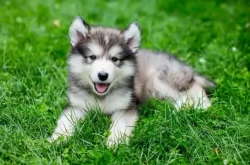 Known also as the Alaskan Klee Klai,the Miniature Siberian Husky stands at 33-39cm in height and weighs between 8 - 11kg.
Known also as the Alaskan Klee Klai,the Miniature Siberian Husky stands at 33-39cm in height and weighs between 8 - 11kg.
These mini huskies are like the larger huskies and can also come in a range of color variations such as grey and white, black and white or red and white for instance. In typical Spitz dog fashion they have the erect ears and long bushy tail. A striking feature of these dogs is the beautiful eyes – they can be brown but also a mesmerising blue.
This Miniature Siberian Husky is an intelligent dog and you’re not going to have any trouble with him teaching him some basic commands such as sit, lie-down and stay.
You need to know that these dogs aren’t going to be content lying around all day and that they want to be kept busy almost around the clock. They have always been working dogs so he will need plenty of mental – and physical exercise to keep him content. A bored, frustrated Mini Husky will just develop problem behavior through no fault of his own. People who buy high energy dogs have a responsibility towards them to keep them busy and well exercised.
These dogs are similar to their genetic ancestor, the wolf, and instead of barking, you may find him trying to communicate with a howl. One thing is sure, they make great family pets, and their gentle nature allows them to get on well with children and also not to show aggression with other dogs. They’re loyal, outgoing and charming.
 A little larger than a mid-sized dog, the Black Russian Terrier is strong, powerful, stable and alert. His head is block shaped and has a broad skull. The muzzle is square with a beard and mustache. A black, large nose and full black lips are matched with powerful and large jaws. He has a scissor bite and his ears should be triangles with rounded apexes. They have very large paws that are bear-like in appearance with thick black pads. They are also covered with hair. Their legs are muscular, powerful and strong. They have a cropped tail.
A little larger than a mid-sized dog, the Black Russian Terrier is strong, powerful, stable and alert. His head is block shaped and has a broad skull. The muzzle is square with a beard and mustache. A black, large nose and full black lips are matched with powerful and large jaws. He has a scissor bite and his ears should be triangles with rounded apexes. They have very large paws that are bear-like in appearance with thick black pads. They are also covered with hair. Their legs are muscular, powerful and strong. They have a cropped tail.
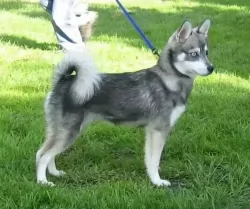 Your cuddly Mini Siberian Husky is such an intelligent dog, active and social and guaranteed to make you a splendid pet.
Your cuddly Mini Siberian Husky is such an intelligent dog, active and social and guaranteed to make you a splendid pet.
Being somewhat wary and aloof with strangers, they also make good watchdogs. They do well with children who have been taught to be kind and gentle with animals.
With good care your dog can reach up to 15 years of age, providing you with many years of superb friendship.
 The Black Russian Terrier is a working dog and he is confident, calm, self-assured and confident. He is responsive and intelligent, protective and fearless, loyal and aloof. He is not welcoming to strangers. If socialized well, he is enough of an independent thinker to be able to decide on his own who or what poses a threat to his family and what doesn’t. They get bored quickly because they are so smart. Keep him stimulated. These are strong, athletic dogs who will love to run with you, jog along side your bike, hike the mountain or just walk with you. Whatever your form of exercise is, the Black Russian Terrier can adapt to it. They also have a strong prey drive so don’t trust them with animals they do not know. They are ok with cats and dogs that they grow up with. They love to play with kids but be careful they don’t unintentionally knock the little ones down.
The Black Russian Terrier is a working dog and he is confident, calm, self-assured and confident. He is responsive and intelligent, protective and fearless, loyal and aloof. He is not welcoming to strangers. If socialized well, he is enough of an independent thinker to be able to decide on his own who or what poses a threat to his family and what doesn’t. They get bored quickly because they are so smart. Keep him stimulated. These are strong, athletic dogs who will love to run with you, jog along side your bike, hike the mountain or just walk with you. Whatever your form of exercise is, the Black Russian Terrier can adapt to it. They also have a strong prey drive so don’t trust them with animals they do not know. They are ok with cats and dogs that they grow up with. They love to play with kids but be careful they don’t unintentionally knock the little ones down.
The Black Russian Terrier matures later than other dogs. Treat the puppy the way you want the adult dog to be. If you don’t want a large dog on your bed don’t let the puppy sleep on the bed. He will soon be a large, powerful and strong dog with a mind of his own and you will not be able to keep him off the bed.
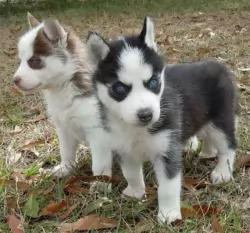 Your Miniature Siberian Husky is a healthy dog and you won’t have to spend too much money on him at the vet. However, just like with any other dog, he can battle with some of the common dog diseases -
Your Miniature Siberian Husky is a healthy dog and you won’t have to spend too much money on him at the vet. However, just like with any other dog, he can battle with some of the common dog diseases -
This eye problem affects about 10% of all Siberian Huskies and its not limited to old dogs. Juvenile cataracts can affect young dogs too. Luckily the problem isn’t painful for the dog.
Skin problems can be a concern for the Mini Siberian Husky, especially as one is used to seeing these dogs with thick coats. Follicular dysplasia is a genetic condition that causes patchy hair loss as well as a scaly, infected skin.
Check out that your dog is receiving nutritious food with vitamins and minerals as a zinc deficiency for instance can cause hair loss as well as skin problems.
 This is a healthy breed who faces some of the same issues other large dogs face such as dysplasia in the elbows and hips. Then they also face their own hereditary diseases such as Juvenile laryngeal paralysis, hyperuricosuria and polyneuropathy. They are also susceptible to heart disease, eye diseases, allergies, Panosteitis and hypertropic osteodystrophy. Let’s look at the major hereditary disease that are not so common.
This is a healthy breed who faces some of the same issues other large dogs face such as dysplasia in the elbows and hips. Then they also face their own hereditary diseases such as Juvenile laryngeal paralysis, hyperuricosuria and polyneuropathy. They are also susceptible to heart disease, eye diseases, allergies, Panosteitis and hypertropic osteodystrophy. Let’s look at the major hereditary disease that are not so common.
This occurs when the larynx arytenoid cartilages stop working and don’t operate so then the adjoining muscles don’t work either and the dog cannot swallow without the possible damage to the airway and the cannot breathe properly during exercise or while panting.
This is a condition that can occur in people and animals. This condition can lead to kidney or bladder stones as there is too much uric acid in their urine.
Like any form of neuropathy, in this disease many different nerves are damaged, and this can cause weak reflexes and tremors. There are effective treatments however.
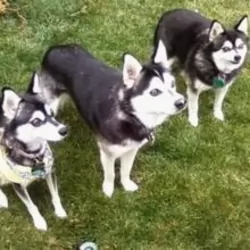 The Miniature Husky is an active and energetic breed that is going to require a lot of exercise. He is able to adapt to life in the city or the countryside but wherever you keep him as a pet, he will require regular daily exercise.
The Miniature Husky is an active and energetic breed that is going to require a lot of exercise. He is able to adapt to life in the city or the countryside but wherever you keep him as a pet, he will require regular daily exercise.
These dogs are used to cold climates so make sure your Mini Siberian Husky doesn’t overheat. Make sure that when he’s outdoors, there is shade for him and a water bowl. You’ll be doing him a real favor if you provide him with a small paddling pool to dip into on a hot day.
These are clean, odorless dogs that actually require little human help to be groomed. You can give your dog a good brush twice a week.
Mini Siberian Huskies, like the larger breed, have a high metabolism, so small amounts of highly nutritious food will do well with them. If you intend feeding your one commercially manufactured food, make sure its the high quality food that comes with plenty of minerals and vitamins. Try and avoid the low quality brands that come packed with unhealthy preservatives and colorants.
Dogs do well on simple, nutritious diets, so some boiled chicken, brown rice and raw and cooked vegetables such as carrots, potatoes and spinach added into the dry kibble from time to time will do him wonders.
Also try and include some raw meat into the kibble from time to time. That's it, as simple as that- no exotic, spicy foods and foods which we humans eat such as nuts, chips and chocolate – all can be toxic for your pet and just give him an upset stomach.
Make sure fresh, cool water is constantly available.
 This is a large, working dog that needs healthy nutrition. Feed once or twice a day but do not overfeed. Don’t let your Black Russian Terrier get overweight. Proper nutrition for puppies is critical given the nutrionally based diseases discussed below.
This is a large, working dog that needs healthy nutrition. Feed once or twice a day but do not overfeed. Don’t let your Black Russian Terrier get overweight. Proper nutrition for puppies is critical given the nutrionally based diseases discussed below.
This is a high energy dog that needs to work. He doesn’t just want to work, he needs to work. So, find him a job and one that includes a lot of exercise. He needs consistent and firm training but will respond well and excel in Obedience Trials. They are good at Schutzhund and agility. They need plenty of exercise and will be unhappy and destructive without enough and a job. He needs to burn off that energy.